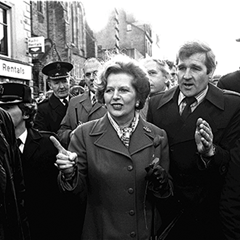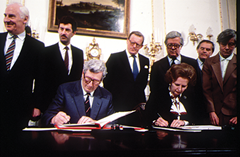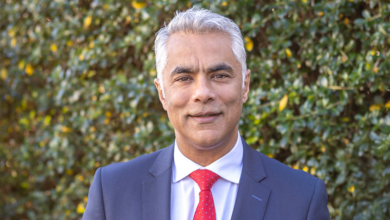The Thatcher years
 The death of Margaret Thatcher has reignited debate about her 11 years as Prime Minister. Peter Cheney considers her divisive legacy in Northern Ireland.
The death of Margaret Thatcher has reignited debate about her 11 years as Prime Minister. Peter Cheney considers her divisive legacy in Northern Ireland.
Two events near the start and end of Margaret Thatcher’s time in office framed her view of Northern Ireland and its conflict. The murders of Airey Neave and Ian Gow were deeply personal losses to her.
Thatcher mourned Neave, the Shadow Northern Ireland Secretary, as “one of freedom’s warriors” while Gow’s death was a reminder of how close the IRA had come to killing her in the Brighton bombing.
Republicans and Mrs Thatcher held each other in mutual contempt. Her public attitude to the hunger strikers was summed up in the quote: “Crime is crime is crime. It is not political.” Cabinet records released in 2011 show that Thatcher had been prepared to make some concessions if the hunger strikes were called off.
Unionist tributes were warm despite their previous clashes with the Iron Lady. Peter Robinson recalled a “transformative and powerful Prime Minister” who was “one of a kind, tough, possessed of a supreme intellect and driven by conviction.” Ian Paisley reflected: “In every phase of life, she was great.”
Gerry Adams’ unforgiving statement set the tone for Sinn Féin: “Here in Ireland, her espousal of old draconian militaristic policies prolonged the war and caused great suffering.” Mike Nesbitt said that Northern Ireland “has reason to be eternally grateful for her stance against terrorism.”
John Hume extended his sympathies to the Thatcher family but noted that her “belligerent and uncompromising approach” during the hunger strikes “won her few friends among nationalists.” His comments were echoed by Alasdair McDonnell.
David Ford remembered a “very divisive figure in domestic politics”. Northern Ireland Conservative Chairman Irwin Armstrong said that Thatcher was a “truly great” Prime Minister who “epitomised that much sought after political quality: leadership.”
Legacy
From a modest background as a grocer’s daughter, Margaret Thatcher made history as Britain’s first and only female Prime Minister and the longest-serving holder of the post in the 20th century. She appears to have taken little interest in Northern Ireland until her election as Tory leader in 1975.
“There is one part of this country where, tragically, defiance of the law is costing life day after day,” she told that October’s party conference. She added: “We believe that our armed forces must remain until a genuine peace is made.”
She set out her stall, in policy terms, in a speech at a Belfast business lunch in June 1978. Thatcher praised the province’s strong “spirit of initiative and enterprise” but recognised the need to continue above average public spending and state support to local industries. Both policies continued throughout her time in government although public service budgets within the block grant experienced cuts.
“I am not prepared to preside over a country that’s going into perpetual economic decline,” Thatcher added as she envisaged a “nation-wide, capital-owning democracy”.
Her political legacy included the Anglo-Irish Agreement but little progress was made on resolving the conflict. In the last days of her premiership, Secretary of State Peter Brooke affirmed that the UK Government had no “selfish economic or strategic interest” in Northern Ireland. This was interpreted, at the time, as a betrayal by unionists.
The Conservative Party started to organise in Northern Ireland in 1989 although this was due to campaigning by local members against opposition by the party leadership. There is no record of Mrs Thatcher returning to Northern Ireland after she left office.
Widespread factory closures occurred as the recession hit manufacturing hard. Dole queues in Northern Ireland rose from 52,000 people in May 1979 to a peak of 123,000 in October 1986: 17 per cent compared to 10 per cent in the UK as a whole.
Government support, though, did sustain Shorts and Harland and Wolff which were sold back into the private sector in 1989. Local unemployment stood at 94,500 when Thatcher left office in November 1990.
The shift from the state to private sector is one of Thatcher’s strongest legacies. Indeed, so strong that no national or devolved government has rolled back on privatisation or the right-to-buy in social housing.
 Britain became richer over the Thatcher years but prosperity was unevenly distributed. Her tough response to the miners’ strike left bitter memories among mining communities, which were starkly evident in the response to her death. The coal industry, though, was also in long-term decline. Thatcher closed 109 pits in total but a Labour predecessor, Harold Wilson, had closed 352.
Britain became richer over the Thatcher years but prosperity was unevenly distributed. Her tough response to the miners’ strike left bitter memories among mining communities, which were starkly evident in the response to her death. The coal industry, though, was also in long-term decline. Thatcher closed 109 pits in total but a Labour predecessor, Harold Wilson, had closed 352.
Michael Heseltine believes that many of her economic changes would have happened regardless of Thatcher. Similar trends took place in France and Germany but both countries retained large manufacturing sectors. The growth of the financial sector drove the UK’s recovery in the 1980s but over-dependence on banking contributed to the current downturn.
Her disdain for the IRA was clear in her last recorded comments on the province. In an April 1999 speech to businesspeople in London, she noted that “Irish terrorist murderers are flooding out of jail.” Later that year, Peter Mandelson claims that she warned him against trusting the Irish as they were “all liars.” Likewise, she never forgave the Tory rebels who ended her premiership.
In later years, her once formidable memory was dimmed by dementia. The Iron Lady experienced the slow, often distressing deterioration undergone by many frail and elderly people. “Lying here,” the Bishop of London said, “she is one of us, subject to the common destiny of all human beings.”
Opinion on her legacy will always be divided but neither side can doubt her political convictions or her personal determination.
Anglo-Irish Agreement: reactions recalled
The Anglo-Irish Agreement was signed by Margaret Thatcher and Taoiseach Garret FitzGerald at Hillsborough Castle on 15 November 1985. The SDLP was its strongest supporter, having worked with the Irish and US governments to put pressure on Thatcher.
John Hume told the Commons: “The only alternative is the old one of hopelessness, tit-for-tat, revenge, the old doctrine of an eye for an eye which has left everybody blind in Northern Ireland.” The Alliance Party also backed the agreement as a step towards an eventual peace settlement.
Unionists fiercely protested against the document for allowing the Republic a say in the province’s affairs. Ian Paisley made his famous “never, never, never” speech. James Molyneaux claimed that the agreement would “destroy any possibility of achieving peace, stability and reconciliation.”
Sinn Féin was also opposed as the agreement maintained British rule in Northern Ireland. The deal was superseded by the Good Friday Agreement in 1998.





